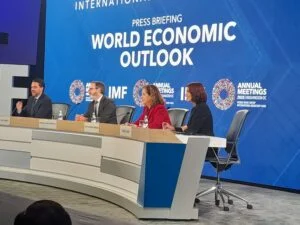The International Monetary Fund (IMF) says global growth is projected to slow from 3.3 per cent in 2024 to 3.2 per cent in 2025 and 3.1 per cent in 2026.
Tobias Adrian, the Financial Counsellor and Director, Monetary and Capital Markets Depart, IMF, said this on Tuesday in Washington.
Adrian was presenting the World Economic Outlook (WEO) for October on the sidelines of the Annual Meetings of the World Bank Group.
He said that the situation would see advanced economies growing around 1.5 per cent and emerging market and developing economies just above four per cent.
He projected inflation to continue to decline globally, though with variation across countries; above target in the U.S., with risks tilted to the upside, and subdued elsewhere.
According to the him, the global economy is adjusting to a landscape reshaped by new policy measures.
“Some extremes of higher tariffs were tempered, due to subsequent deals and resets.
“But the overall environment remains volatile, and temporary factors that supported activity in the first half of 2025, such as front-loading, are fading.
“As a result, global growth projections in the latest WEO are revised upward relative to the April WEO, but continue to mark a downward revision relative to the pre-policy-shift forecasts,” he said.
He said that risks were tilted to the downside, adding that prolonged uncertainty, more protectionism, and labour supply shocks could reduce growth.
“Fiscal vulnerabilities, potential financial market corrections, and erosion of institutions could threaten stability,” Adrian said.
He urged policymakers to restore confidence through credible, transparent, and sustainable policies.
“Trade diplomacy should be paired with macroeconomic adjustment. Fiscal buffers should be rebuilt. Central bank independence should be preserved. Efforts on structural reforms should be redoubled.
“As shown in the second chapter, past actions to improve policy frameworks have served countries well.
” As Chapter 3 demonstrates,
industrial policy may have a role, but full consideration should be given to opportunity costs and trade-offs involved in its use,” he said.
He said that in April, the U.S. shook global trade norms by announcing sweeping tariffs.
”Our April report offered a range of estimates for the resulting growth downgrade, from modest to significant.
“Six months on, where are we? The good news is that the growth downgrade is at the modest end of the range, with growth projected at 3.2 per cent this year and 3.1 per cent next year.
“Inflation has increased modestly and is proving more persistent,” he said.
He said that the the tariff drop is mainly responsible for the modest impact.
“The tariff drop itself is smaller than initially feared, with many trade deals and sanctions.
“Most countries also refrained from retaliation, keeping the trading system open, and the private sector, too, has died out, contrary to the importance of re-welding supply chains.














